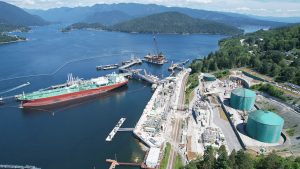National industry stakeholders hold a common view on the federal government’s purchase of the Trans Mountain project from Kinder Morgan: it’s a good thing it happened but it should never happen again.
“Given the circumstances, the government did the right thing to make sure the project had every opportunity to succeed,” said Association of Consulting Engineering Companies — Canada president and CEO John Gamble.
He said the natural resources sector is important to the economy and Canada has the ability to undertake major resource projects in a safe and responsible manner, but going forward changes must be made.
“Government needs to take a good hard look to see if their legislative agenda will increase or decrease the likelihood of this happening again,” Gamble said. “We have lots of well-intentioned policies regarding the environment and community needs, but they need to be pragmatic.
“It’s not just how we go forward, but also how to not find ourselves in this position again.”
Other resource associations held similar reservations.
“The way we found ourselves in this situation, where government had to ensure it was being built, is very disappointing. But we are where we are, and government did step in and that’s crucially important to upstream producers,” said Canadian Association of Petroleum Producers president and CEO Tim McMillan. “But being that we’re at the one second to midnight point on this project, if it didn’t go forward it sends a worse message.”
McMillan said there were precursors to the Trans Mountain buyout, such as the federal government cancelling the Northern Gateway project and TransCanada cancelling Energy East last year when it determined conditions for the project were no longer tenable.
“These challenges are something we can’t afford as a nation,” he said.
McMillan zeroed in on current legislation such as Bill C-69 as a key factor in continued uncertainty in the resource sector. The bill would replace the current Canadian Environmental Assessment Agency with a new Impact Assessment Agency of Canada to lead all major assessments.
“We thought proposing regulatory changes was an opportunity for substantial improvement. But unfortunately, Bill C-69 will put us in a worse position than we’re in today,” he said. “It leaves too many avenues for delay and for undue actors.”
McMillan singled out organized activists, whom he said have an objective of stopping exports from reaching B.C. tidewater.
“The B.C. Green Party was pulling the strings on this file. They weren’t hiding it at all and said they would only prop up the NDP if they did their bidding,” McMillan claimed.
B.C. Green Party leader Andrew Weaver said in a statement the federal government’s decision to purchase the Trans Mountain pipeline was “a betrayal.”
“A government that promised to end fossil fuel subsidies and to champion the clean economy should not be spending billions of dollars of taxpayer money to buy out a fossil fuel expansion project. We should be investing in growth industries that are clearly where the world is heading. Investing in this pipeline is like investing in the horse and buggy industry at the advent of the car,” Weaver said.
Canadian Energy Pipeline Association president Chris Bloomer agreed current and planned legislation is inadequate for the task at hand.
“Trans Mountain will have its own trajectory. But we need to look to the future. What have we learned? We learned the regulatory process didn’t provide clarity and certainty. Will proposed changes bring that clarity and certainty? In our opinion, no it won’t,” Bloomer said. “Bill C-69 is a big problem, and we don’t think it will achieve what we need even in its amended form. We need a national vision of where the oil and gas sector contributes to the economy going forward.”
However, the Trans Mountain project will prove to be of great benefit to Canada and to B.C. and Alberta in particular, he said.
“It’s a tremendous uplift for the whole labour side of things and for communities, and it will have a tremendous impact on the average person in B.C. and Alberta. Once this project is built, it will be a major contributor to the economy,” Bloomer stated.
Canada’s Building Trades Unions Canadian operating officer Robert Blakely specified the benefits to skilled tradespeople, adding the new jobs might tilt the balance and push B.C. towards supporting the pipeline.
“The Kinder Morgan project transports raw bitumen to tidewater; a definite plus for an industry that has suffered from having only one customer. The ownership by Canada may open prospects for the upgrading or further processing of some or all of that bitumen in Canada. That would be a boon to jobs for high skilled trades in Canada and create opportunities for apprenticeships and great careers in communities along the right-of-way,” Blakely said. “Perhaps this prospect will stir the Government of British Columbia to rethink its opposition and to try and help in creating jobs here in Canada.”
The Canadian Construction Association also approves of the government’s actions.
“We are pleased the government acknowledges the importance of this project to Canada’s economy. CCA is considering the implications of the government’s steps,” a statement from the association reads.











Recent Comments
comments for this post are closed